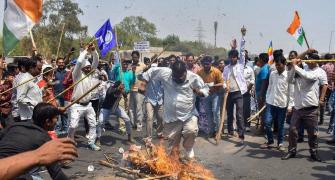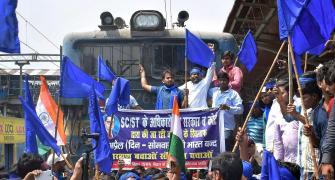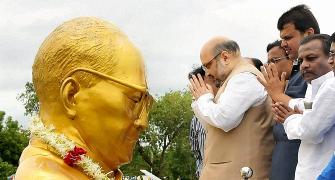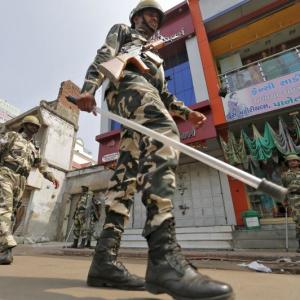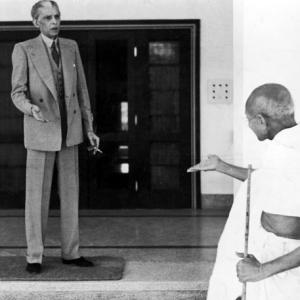The brazen politics, in this series of bullying of AMU by functionaries of the Union and provincial governments, utterly disregarding the fact that the matter is sub judice, is quite obvious.
One needs to see through the desperate politics of the BJP which governs both Uttar Pradesh and the Centre, especially its woes over its Dalit support base, says AMU Professor Mohammad Sajjad.

Aligarh Muslim University has once again been dragged into a controversy.
Uttar Pradesh Chief Minister Ajay Singh Bisht issued a statement that AMU should implement a quota for the scheduled castes and scheduled tribes. He chose to ignore the fact that AMU's case in this regard is sub judice in the Supreme Court.
Truth be told, AMU does not offer admissions on a religious basis. Even though clause 5(2)(c) of the AMU (Amendment) Act 1981 provides for promoting 'especially the educational and cultural advancement of the Muslims of India'.
Only once, in 2005, based on the said clause, AMU attempted to treat itself as a Muslim minority institution with regard to its admission policy.
This was struck down by the Allahabad high court in October 2005. The university appealed to the Supreme Court.
Ever since the matter has been sub judice.
The Supreme Court, however, did not do away with AMU's admission policy existing prior to 2005 which, as I said, did not have any reservations on a religious basis.
Now, Bharatiya Janata Party leader and chairman of the National Commission for Scheduled Castes and Scheduled Tribes, Ramashankar Katheria, has said he would write to the HRD ministry to review the grants being given to the Aligarh Muslim University that, according to him, has 'refused to implement quotas'.
A day later, Brij Lal, chairman of the SC/ST Commission of Uttar Pradesh, is reported to have issued a notice to AMU expressing his displeasure over why it has not implemented quotas for SC/STs.
The brazen politics, in this series of bullying of AMU by functionaries of the Union and provincial governments, utterly disregarding the fact that the matter is sub judice, is quite obvious.
Unfortunately, sections of print and television news media have not been able to muster up enough courage to expose the cynically opportunistic politicking by the incumbent regimes.
On May 7, a television news channel ran an hour-long debates on AMU, hectoring it on why its Students Union Hall has M A Jinnah's portrait since 1938. This was at a time when the campaign for the Karnataka assembly polls was coming to an end. The very same issue was raked up a few weeks during the Kairana Lok Sabha by-polls later.
One needs to see through the desperate politics of the BJP which governs both Uttar Pradesh and the Centre, especially its woes over its Dalit support base.
In the Phulpur and Gorakhpur Lok Sabha by-polls, thanks to the Samajwadi Party-Bahujan Samaj Party alliance, the BJP got a drubbing despite the fact that the latter has been a pocket borough of the incumbent chief minister for long and the former seat belonged to the incumbent deputy chief minister, Keshav Prasad Maurya.
Ever since Ajay Singh Bisht became UP chief minister in March 2017, the Dalit discontent across Uttar Pradesh, and the country, has been widespread.
The Guardian newspaper in London reported that a Dalit law graduate from AMU, Sanjay Jadhav, had to move the high court to ask the government to provide security to his baraat.
His baraat was to pass through a western Uttar Pradesh village dominated by upper caste Rajputs, the caste to which Bisht belongs.
The Rajputs have not been allowing any Dalit to pass through this village; a Dalit bridegroom, riding a horse, leading his baraat party is anathema!
The beginning of Dalit discontent against the BJP regime commenced with the suicide of a bright Dalit student of the prestigious University of Hyderabad, Rohith Vemula, which led to a national uproar.
It was followed by atrocities against Dalits in Una, Gujarat, and in Muzaffarpur, Bihar.
In premier institutions like IITs, cases of Dalit students committing suicide over the discrimination they suffer from in those institutions keep coming up.
An all India bandh in April by Dalits protested the Supreme Court verdict to dilute the penalty provisions of the Dalit Atrocities Act of 1989.
Given this background, significantly, no Dalit activist or political formation has asked for quotas in AMU, even though they have been agitating against the latest UGC order to implement quotas in recruitments by centrally-funded universities at the disaggregated level of each departments of studies, rather than ensuring its aggregate at the level of each university.
This is seen as an attempt at sabotaging the implementation.
Moreover, they have also come out with the data that despite quotas, the scheduled castes are grossly under-represented in the teaching and non-teaching staff of central universities.
Dalits don't seem to be as much concerned about the little space in AMU admissions and recruitments, hence no such demand from them.
They are rather more concerned about the universities dominated by the Savarnas (the dominant castes).
They also ask for quota in the private sector, on which the BJP remains silent.
Dalits are more concerned about their dignity and share in structures and processes of power which, they argue, is being resisted by the Savarnas.
The reactionary upper castes have been arguing against quotas on the pretext of meritocracy, but they only need to look back on the educational institutions established by private initiative.
The landlord politicians opened colleges, made almost cent per cent recruitments from their own castes, and then these colleges were taken over by the provincial governments.
This was an arrangement of almost cent per cent reservation, and no meritocracy.
Similarly, even before privatisation, the well-off segments got admissions on the basis of capitation fee in medical and engineering colleges. These admissions were surely not meritocratic.
The BJP's utterly desperate ploy to create a wedge in the emerging Dalit-Muslim unity for the next general election is understandable.
Let it be recalled that the Muzaffarnagar communal violence of 2013 began after the Pasmanda Kranti Abhiyan, a movement to mobilise backward Muslims of UP which began in 2012, issued an interesting slogan: 'Dalit-Pichchara ek saman, Hindu ho ya Musalman (Dalits and backwards are the same, whether they are Hindus or Muslims)... the first phase of this movement (was) about to complete on 30 September 2013' (Hilal Ahmed, Economic and Political Weekly, October 5, 2013).
Coming back to AMU, its existing enrolments do testify that despite a no religion-based quota, it does have a fairly significant presence (almost 50%) of non-Muslims in professional courses.
All this, however, should not make AMU stay in the whirlpool of retrogression.
The AMU does have certain 'proxy' quotas for 'internal' students, and also for the children of alumni and employees in all courses (except for MBBS/MD/MS).
This, I think, does not go with the spirit of social justice. Rather, it implies favours to the privileged.
The Ajlaf and Arzal (together called Pasmanda) categories of Muslims have been challenging the Ashrafiya hegemony.
Unfortunately, the Arzal struggle to be listed as scheduled castes remain unaccomplished; this is religion-based discrimination inflicted upon by the Presidential Ordinance of 1950.
AMU admission policies should develop some device to consider awarding certain deprivation points to such categories.
Representation of the historically oppressed groups must be enhanced.
Beyond AMU too, in 'proper' Muslim minority institutions, the Pasmanda groups remain grossly under-represented.
The Muslim Ashrafiya must give way to the practices of social justice within the institutions managed/controlled/dominated by them.
Professor Mohammad Sajjad is at the Centre of Advanced Study in History, Aligarh Muslim University.

